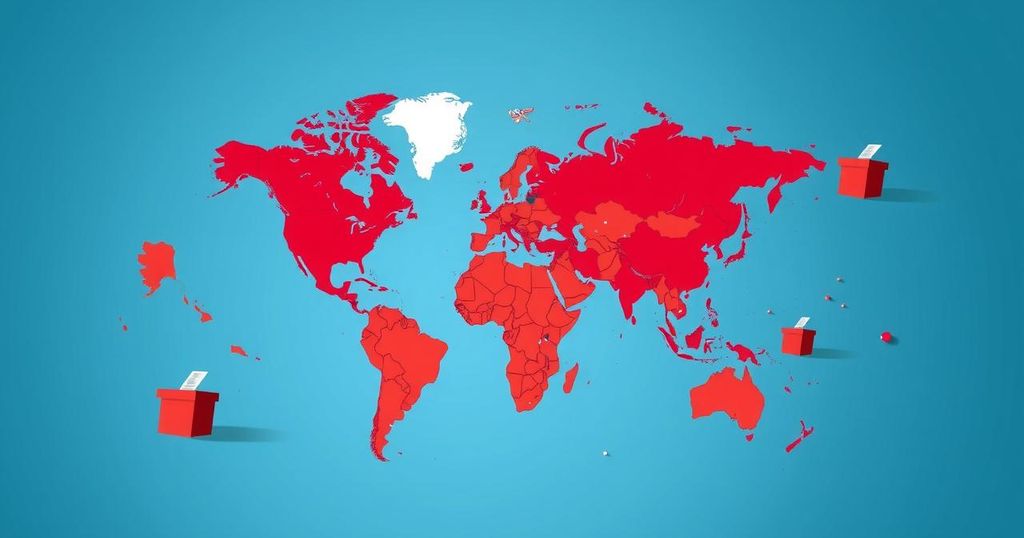Global Elections of 2024: A Year of Political Transformation
In 2024, global elections saw around 4 billion voters, marking history in democratic engagement. Major events included Donald Trump’s reelection in the US, shifts in India’s ruling coalition, political instability in France and Germany, and significant changes in Latin America and South Africa, reflecting diverse global sentiments and leading to a reevaluation of international relationships and policies.
In 2024, approximately 4 billion people, nearly half of the global population, participated in what has been termed one of the most democratically vigorous years on record. In South Africa and India, ruling parties witnessed declining support attributed to corruption and concerns over democratic integrity. Concurrently, European nations experienced political upheaval as far-right parties gained traction and established powers like France and Germany encountered governmental instability. Notably, the United States observed Donald Trump’s political resurgence, greatly influencing future international relations.
The reelection of Donald Trump on November 5 marked a significant political comeback, securing both the popular and electoral votes after a campaign focused on economic dissatisfaction and anti-immigration rhetoric. Analysts indicated that Trump’s appeal had broadened among non-college-educated demographics that formerly aligned with the Democratic Party. With Republicans regaining control over the House and Senate, the forthcoming legislative agenda appears to favor Trump’s policies.
In Asia, Indian Prime Minister Narendra Modi faced unexpected losses, resulting in a coalition government, a development interpreted by many as a sign of democratic resilience. As Modi seeks to advance his agenda, the challenges presented by a divided government may impede his controversial reforms. In Indonesia, the election of Prabowo Subianto, surrounded by controversy, indicated an intention to attract foreign investment while balancing complex relations with China and the United States.
France encountered significant political turmoil following President Emmanuel Macron’s decision to initiate a snap election, which resulted in a fractured parliament. This instability limits the government’s capacity to address rising national debt and poses challenges to European security partnerships. In the United Kingdom, the Labour Party’s victory ended 14 years of Conservative governance; however, the new Prime Minister, Keir Starmer, struggles with public perception amid ongoing social issues.
In Latin America, Claudia Sheinbaum’s victory in Mexico established a significant milestone as the first female and Jewish president, although her administration inherited ongoing scrutiny regarding judicial reforms and crime rates. In Venezuela, President Nicolás Maduro’s reelection occurred under allegations of electoral malpractice, leading to protests amid a deteriorating economy. South Africa’s elections resulted in the African National Congress losing its parliamentary majority for the first time, prompting a coalition government, while ongoing economic and social challenges remain storefront issues for the new administration.
The year 2024 has been characterized by a notable surge in global electoral participation, reflecting a turning point in international political dynamics. Various elections offered insights into changing political landscapes, particularly as established parties faced challenges amidst allegations of corruption and governance failures. The growing acceptance of far-right ideologies in Europe and the fluidity of political majorities in nations such as India, Indonesia, and South Africa highlight the shifting allegiances of voters in response to socio-economic conditions and governance issues. As these developments unfold, they are expected to influence global geopolitics, trade relations, and domestic policies.
The elections that occurred globally in 2024 have been pivotal in reshaping political landscapes, influencing economic policies, and realigning international relations. The varied outcomes—from Trump’s comeback to coalition governments in India and South Africa—illustrate a trend towards increased political engagement and, at times, turbulence. As these developments continue to take shape, their implications for years to come will be significant, particularly in the context of governance and international diplomacy.
Original Source: www.semafor.com




Post Comment